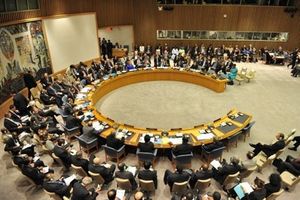 The UN Security Council has voted unanimously to impose sanctions on Muammar Gaddafi's Libyan regime for its
attempts to put down an uprising.
The UN Security Council has voted unanimously to impose sanctions on Muammar Gaddafi's Libyan regime for its
attempts to put down an uprising.
They backed an arms embargo and asset freeze while referring Col Gaddafi to the International Criminal Court for alleged crimes against humanity.
US President Barack Obama has said the Libyan leader should step down and leave the country immediately.
Discussions on forming a transitional government are reportedly underway.
Mustafa Abdel-Jalil - who resigned as justice minister in protest against the excessive use of force against demonstrators - said a body comprising military and civilian figures would prepare for elections within three months, Libya's privately-owned Quryna newspaper reported.
Libya's ambassadors to the United States and UN have both reportedly voiced their support for the plan, which was being discussed in the rebel-controlled eastern town of Benghazi.
The UN estimates more than 1,000 people have died as Col Gadddafi's regime attempted to quell the 10-day-old revolt.
The global body's World Food Programme has warned that the food distribution system is "at risk of collapsing" in the North African nation, which is heavily dependent on imports.
Struggle for controlSaturday night's vote was passed unanimously by all 15 members. Ahead of the vote, UN Secretary General Ban Ki-moon had urged the Security Council to take "decisive action" over the Libya crisis.
The Libyan delegation at the UN had sent a letter to the Council backing measures to hold to account those responsible for armed attacks on Libyan civilians, including action through the International Criminal Court - which had been one of the main points of contention in the resolution.
The US has already imposed sanctions against Libya, and closed its embassy in Tripoli.
On Saturday, one of Col Gaddafi's sons, Saif al-Islam, insisted that normal life was continuing in three-quarters of Libya. By contrast, anti-Gaddafi forces say they control 80% of the country.
Each side's claims are difficult to confirm but it is known that the opposition controls Benghazi, Libya's second city, while Col Gaddafi still controls the capital Tripoli, home to two million of the country's 6.5 million population.
EvacuationThousands of foreign nationals - many of them employed in the oil industry - continue to be evacuated from the country by air, sea and land.
Saturday saw two British military transport aircraft pick up about 150 foreign nationals in the desert south of Benghazi and fly them to the Mediterranean island of Malta.
Britain also announced it had temporarily closed its embassy in Tripoli and pulled out its staff on the last UK government-chartered aircraft because of the deteriorating security situation.
Some 10,000 people remain outside Tripoli airport's terminal building and several thousand more are inside, says BBC Middle East editor Jeremy Bowen, who saw piles of discarded luggage abandoned by people desperate to flee the country.
Most of those trying to leave were Egyptians, many of whom had been waiting at the airport for several days.
Friday saw Col Gaddafi make a defiant address to supporters in Tripoli and reports of anti-government demonstrators in several areas of the city coming under fire from government troops and pro-Gaddafi militiamen.
On Saturday the capital city was calm, with shops open, people on the streets, and supporters of Col Gaddafi reportedly occupying central Green Square in a public show of support for the beleaguered leader.
Outside the capital, anti-Gaddafi protesters were consolidating their power in Benghazi, with leaders of the uprising establishing committees to run the city and deliver basic services.
Rebels were reportedly fighting units of the regular army in the western cities of Misrata and Zawiya.

/image%2F0994931%2F20220514%2Fob_0ba45b_picture-interview2.jpg)